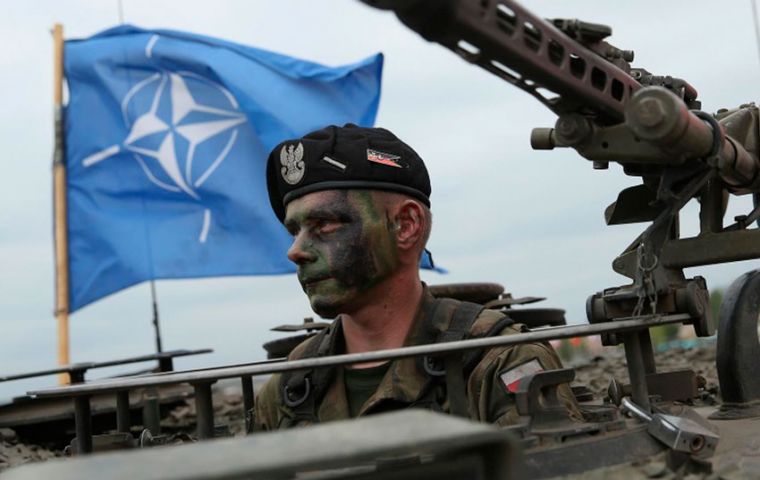MercoPress. South Atlantic News Agency
Bolivian top-secret dossier shows NATO's expansion into South America
 The possibility of Latin American countries becoming NATO partners is not to be ruled out
The possibility of Latin American countries becoming NATO partners is not to be ruled out A newspaper report released Monday by Buenos Aires' daily Página 12 explained how the North Atlantic Treaty Organization (NATO) has expanded its influence over South America. The news outlet said the document which proved their story was “top secret.”
First and foremost, Página 12 singled out the British Mount Pleasant base in the Falkland Islands as a NATO milestone in the region. Then it said Colombia was an “extra-continental partner since 2017 and its doctrine was already used to train Bolivian Air Force officers, according to the 83-page document, which explicitly admits that the Non-Conventional Combined Operational Exercise was meant to be a ”practice and application of Planning under NATO doctrine and terminology in Combined Aerospace Operations” for senior war aviation officers.
The drill -held between January-February 2021, when President Luis Arce Catacora was already at the helm of Bolivia- did not involve any field action; it consisted of classroom analysis of hypothetical situations -drug trafficking, according to the dossier- at the Bolivian Air Command and Staff School (ECEMA) in Sucre, Página 12 explained.
The document states that, for “security” reasons, military training must be considered “top secret” and that everything related to it “will be classified as such”.
The studies focused on a border area of three neighboring countries, which in turn are identified by colors. Blue (“AZUL” in the dossier) is Bolivia, yellow is Brazil (“AMARILLO”) and white is Peru (“BLANCO”) and potential armed conflicts were assessed, taking also into account the possible presence of irregular armed groups in the areas, which could engage national troops of “the neighboring countries involved.”
NATO's doctrine is reflected on page 22: ”Due to the seriousness of the situation AZUL appeals to the international community. The OAS with the consent of the UN responds by forming a regional force to intervene in support of AZUL, forming for this purpose a South American regional CJTF (Combined Joint Task Force) with its air component CJFACC with the countries of AMARILLO and BLANCO”.
Although under Evo Morales the Drug Enforcement Administration (DEA) was expelled from Bolivia in November 2008, tactical training in the country remained under parameters similar to those established by the US body.
“The increase in drug trafficking activities has caused certain local political leaders to acquire great economic power and have financed in part the presence of foreign elements, which indoctrinate the population of the tropics so that they reject the presence of the Armed Forces and the National Police, thus allowing the drug trafficking clans to operate freely,” the dossier read, according to Página 12.
Narco-criminality “has received external support from other countries, gathering a large number of weapons, transport vehicles, aircraft, and river vessels in order to carry out attacks on the Armed Forces that carry out eradication in the areas declared as producers of the millenary leaf,” the intelligence document went on.
It also mentions Peru as fertile territory for the development of illegal activities. “The Red Command and the PCC have emissaries in the jungle of BLANCO where cocaine base paste is produced.”
Regarding Bolivia, the dossier specifies that “drug trafficking corridors are appearing along rivers and canals in AZUL, which threatens to complicate the country's efforts to stop the flow of cocaine to international markets.”
Some officers who attended this theoretical exercise in Sucre have been trained in the US and possibly in Colombia, according to Página 12. Colombia is the only Latin American country approved to join NATO after an agreement with former President Juan Manuel Santos.
In December of 2021, Colombia's Defense Minister Diego Molano signed a new agreement with NATO's Deputy Secretary-General Mircea Geoana, of Romanian origin.
Several NATO member countries near Russia's border are considered a threat to national security by President Vladimir Putin. To the east, Colombia borders Venezuela, a key ally of Putin.
In a recent trip to Israel, Melano -a former aide to then-President Álvaro Uribe- said that “here we have a common enemy and that is the case of Iran and Hezbollah, which operate against Israel but also support the Venezuelan regime.” Colombia has maintained diplomatic ties with Tehran since 1975 and current President Iván Duque had to step in to avoid a tougher diplomatic crisis.
NATO Secretary-General Jens Stoltenberg had warned in February 2019, when the Civil War in Ukraine was into its fifth year, that “it is a possibility to consider the option that other Latin American countries also become partners [of NATO],” which the Bolivian document would now corroborate, according to the Buenos Aires daily.
(Source: Página 12)




Top Comments
Disclaimer & comment rulesCommenting for this story is now closed.
If you have a Facebook account, become a fan and comment on our Facebook Page!